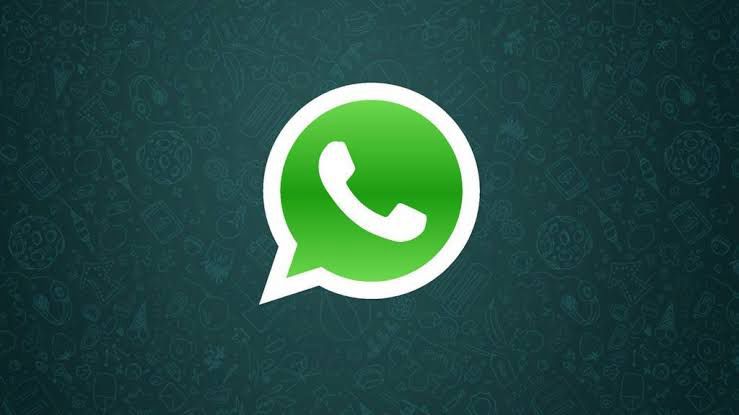
WhatsApp Messenger – A top messaging app with 564 million downloads, offering secure and versatile communication.
WhatsApp Messenger: A Leading Messaging App with 564 Million Downloads** WhatsApp Messenger stands out as a globally dominant messaging platform with over 564 million downloads, offering a secure and versatile communication experience. Known for its **end-to-end encryption**, **multimedia sharing capabilities**, and **cross-platform compatibility**, WhatsApp caters to personal, professional, and business communication needs. Its constant updates and innovations ensure its continued growth, ma
✨ Raghav Jain

WhatsApp Messenger – A Top Messaging App with 564 Million Downloads, Offering Secure and Versatile Communication
In the vast landscape of digital communication, few platforms have left a more significant mark than WhatsApp Messenger. Originally launched in 2009 by Brian Acton and Jan Koum, WhatsApp quickly evolved from a simple status update tool into a robust messaging service. Now, with an astounding 564 million downloads, it stands tall among the most used and beloved messaging apps globally. The app's success can be attributed to its security features, user-friendly interface, and versatile communication tools that cater to both personal and professional needs.
The Rise of WhatsApp
WhatsApp’s journey from a niche application to a household name is a testament to its intuitive design and powerful functionality. In 2014, Facebook (now Meta Platforms, Inc.) acquired WhatsApp for a staggering $19 billion, a clear indication of its influence and future potential.
The app was created with a simple but powerful idea: to allow people to send messages to anyone, anywhere, without the cumbersome fees of traditional SMS services. Over time, it added a range of features including multimedia sharing, group chats, voice and video calls, and even business communication tools.
Today, WhatsApp is used by over 2 billion active users monthly and continues to grow, especially in emerging markets like India, Brazil, and parts of Africa.
Key Features That Define WhatsApp
Several features distinguish WhatsApp Messenger from its competitors:
1. End-to-End Encryption
One of WhatsApp’s major selling points is end-to-end encryption. Introduced in 2016, this feature ensures that messages, calls, photos, and videos are secured and can only be read by the sender and the recipient. Not even WhatsApp or Meta can access the content.
This focus on privacy and security is particularly important in today’s digital age, where concerns about surveillance, hacking, and data breaches are rampant.
2. Free Voice and Video Calls
WhatsApp allows users to make high-quality voice and video calls over the internet without incurring traditional telephone charges. Whether it’s a quick check-in with family overseas or a business meeting, WhatsApp provides a stable and cost-effective solution.
3. Group Chats and Communities
The app offers the ability to create group chats for up to 1024 participants, making it ideal for everything from planning a family reunion to coordinating workplace projects. WhatsApp recently introduced Communities, a feature that allows multiple groups to be organized under one umbrella, making large-scale communication more organized.
4. Media and File Sharing
WhatsApp makes it easy to share photos, videos, documents, and even location in real-time. The app supports sending large files and recently introduced the ability to send files up to 2GB, a significant upgrade that makes collaboration seamless.
5. WhatsApp Web and Desktop Apps
Recognizing that users often switch between mobile and desktop, WhatsApp offers a Web version and Desktop apps for Windows and Mac. These versions synchronize seamlessly with the mobile app, allowing users to continue conversations across devices.
6. Status Updates
Borrowing from social media trends, WhatsApp introduced the Status feature, allowing users to post text, photos, videos, and GIF updates that disappear after 24 hours. This adds a fun and casual dimension to communication.
7. WhatsApp Business
Understanding the importance of small and medium-sized enterprises (SMEs), WhatsApp launched the WhatsApp Business app. It offers features like automated greetings, quick replies, catalog displays, and business profiles to help businesses better connect with customers.
Why WhatsApp Remains on Top
Despite fierce competition from apps like Telegram, Signal, WeChat, and Facebook Messenger, WhatsApp remains a top choice for users worldwide. Here's why:
- Simplicity and Ease of Use
From teenagers to seniors, WhatsApp’s minimalist and intuitive interface makes it accessible to everyone. It doesn’t overwhelm users with too many settings or ads, ensuring a clean user experience.
- Reliability
WhatsApp’s servers boast high uptime rates and efficient message delivery speeds. Even in regions with poor internet connectivity, WhatsApp optimizes its performance to ensure communication isn't disrupted.
- Global Reach
WhatsApp is particularly popular in countries where traditional texting and calling remain expensive. By utilizing internet data instead of SMS or voice minutes, users in developing nations can stay connected affordably.
- Regular Updates and Innovations
WhatsApp is committed to continuous improvement. Regular updates bring new features, security enhancements, and performance improvements, ensuring it stays relevant in a fast-changing tech landscape.
Security: The Cornerstone of WhatsApp’s Success
In the world of messaging apps, security and privacy have become non-negotiable for users. WhatsApp's end-to-end encryption, two-step verification, encrypted backups, and privacy settings (such as controlling who sees your profile photo, last seen, and status) provide layers of protection.
Additionally, two-factor authentication (2FA) adds an extra level of security, ensuring that even if someone gains access to your device, they cannot easily compromise your account.
Despite occasional controversies related to data sharing with Meta, WhatsApp has taken proactive steps to reassure users about the security of personal communications.
The Role of WhatsApp in Business and Community Building
Beyond personal use, WhatsApp has become a crucial tool for businesses and community organizers.
Small businesses use WhatsApp Business to reach customers directly, manage orders, and provide customer support. Nonprofits and community groups utilize WhatsApp Groups and Communities to organize events, share updates, and coordinate actions.
During the COVID-19 pandemic, WhatsApp became a lifeline, enabling doctors, educators, and governments to communicate critical information quickly and efficiently.
Challenges and Criticism
Despite its many strengths, WhatsApp has faced several challenges:
- Misinformation and Fake News: The app’s encrypted nature makes it difficult to trace the source of messages, leading to concerns about the spread of misinformation.
- Privacy Policy Changes: Updates to WhatsApp’s privacy policy in 2021 caused a backlash among users concerned about data sharing with Facebook, prompting millions to explore alternative apps.
- Security Threats: While WhatsApp is generally secure, vulnerabilities have occasionally been discovered and exploited by spyware, such as the infamous Pegasus spyware incident.
Nonetheless, WhatsApp has actively worked to combat these issues through awareness campaigns, forwarding limits, and improved reporting tools.
"WhatsApp Messenger – A top messaging app with 564 million downloads, offering secure and versatile communication."
Here’s the version for you:
WhatsApp Messenger, a globally dominant messaging platform, has carved an indelible mark in the digital communication world, boasting an impressive 564 million downloads and over two billion active users monthly, making it a top choice among users seeking secure and versatile communication solutions. Launched in 2009 by Brian Acton and Jan Koum, WhatsApp began as a simple tool for status updates and rapidly evolved into a comprehensive messaging service, culminating in its acquisition by Facebook (now Meta Platforms, Inc.) in 2014 for $19 billion, a move that underscored its tremendous value and future potential. At its core, WhatsApp’s success lies in its commitment to security, particularly its adoption of end-to-end encryption in 2016, ensuring that only the sender and receiver can access the content of their messages, while even the platform itself remains blind to user communication, thereby reinforcing trust in a world increasingly concerned about privacy breaches. Besides encryption, WhatsApp offers a seamless and user-friendly interface, making it accessible across generations, from tech-savvy millennials to elderly users, which significantly boosts its global appeal. The platform supports not just text messaging but also high-quality voice and video calls, multimedia sharing, location sharing, document exchange, and real-time group communication, elevating it beyond a basic messaging service into a full-fledged communication ecosystem. Furthermore, WhatsApp’s flexibility extends to professional and business contexts with the introduction of WhatsApp Business, a dedicated app that empowers small and medium-sized enterprises to connect directly with customers, automate responses, organize product catalogs, and streamline client interactions without incurring the high costs associated with traditional customer service channels. Additionally, the launch of features like WhatsApp Web and Desktop apps demonstrates the platform's understanding of the need for cross-device communication, allowing users to seamlessly transition between their mobile devices and computers without missing a beat. Another major advancement is the Communities feature, which organizes multiple groups under a single umbrella to facilitate better large-scale communication and management, making it an invaluable tool for educational institutions, nonprofits, and businesses alike. WhatsApp’s resilience and adaptability in the face of growing competition from alternatives like Telegram, Signal, and WeChat stem largely from its strategic innovations, continuous updates, and a commitment to simplicity, ensuring a clean, distraction-free user experience untainted by intrusive advertisements. Despite facing challenges such as the spread of misinformation, controversial privacy policy changes in 2021 that sparked user backlash, and sporadic security threats like the Pegasus spyware scandal, WhatsApp has proactively introduced countermeasures, including message forwarding limits, improved reporting tools, and educational campaigns to promote responsible usage. Its global influence is especially significant in regions like India, Brazil, Nigeria, and Mexico, where high SMS costs and unreliable telecommunication infrastructures make internet-based messaging a more viable and cost-effective option, thus enhancing digital inclusion. The pandemic further highlighted WhatsApp’s critical role as a lifeline for millions, enabling remote education, telemedicine, government announcements, and familial connections during lockdowns, proving its indispensable value in times of crisis. WhatsApp’s media sharing capabilities have also evolved significantly, allowing users to send high-resolution images, videos, voice notes, and files up to 2GB, catering to the increasing demand for rich, multimedia communication without resorting to external file-sharing platforms. Another beloved feature, WhatsApp Status, inspired by social media trends, lets users share fleeting moments with their contacts through photos, videos, and texts that vanish after 24 hours, adding a layer of casual, expressive communication to the platform’s robust feature set. From a technical perspective, WhatsApp continuously works to enhance its infrastructure, maintaining high server uptime rates and optimizing performance even in areas with limited network connectivity, ensuring reliable service for users across different parts of the world. In terms of security, features like two-step verification, encrypted backups, and advanced privacy settings (e.g., hiding last seen, profile photos, or statuses from specific contacts) provide users with granular control over their personal information, empowering them to customize their privacy according to their comfort levels. Even with Meta's broader data-sharing policies, WhatsApp has taken steps to reassure users that private conversations remain securely encrypted and inaccessible to third parties. The platform's future seems poised for further innovation, with upcoming features like multi-device support without constant phone tethering, improved payment services, and expanded business tools that could reshape the way we think about mobile commerce and customer service. As we move toward an even more interconnected world, WhatsApp’s ability to bridge cultural, geographical, and socioeconomic divides highlights its unparalleled role in shaping the modern communication landscape. In conclusion, WhatsApp Messenger’s combination of security, versatility, global reach, and user-centric innovation has solidified its place at the pinnacle of messaging platforms, and with its relentless drive toward improvement, it is well-positioned to remain a vital communication tool for billions in the years to come.
WhatsApp Messenger, a globally recognized and widely adopted messaging application, has achieved an extraordinary feat by amassing an impressive 564 million downloads, cementing its place as one of the leading communication platforms in the world. Launched in 2009 by Brian Acton and Jan Koum, WhatsApp initially began as a simple status update tool for mobile devices, providing users with an innovative way to share their online status with friends and family. However, over the years, the app has evolved into a powerful and comprehensive communication tool that offers far more than just status updates, now facilitating instant messaging, voice calls, video calls, file sharing, location sharing, and much more. One of the core reasons for WhatsApp's incredible success is its focus on security, particularly its introduction of end-to-end encryption in 2016. This encryption ensures that only the sender and the recipient of a message can read its content, thus preventing anyone, including WhatsApp itself or even its parent company Meta, from accessing private communications. This focus on privacy has been especially important in a time when concerns around digital surveillance, data breaches, and privacy violations have become increasingly prevalent. In addition to its security features, WhatsApp is beloved for its simplicity and ease of use. Unlike other messaging apps that may overwhelm users with complex settings or features, WhatsApp offers a clean, minimalist interface that makes it accessible to people of all ages and technical proficiency. The app has succeeded in reaching a broad demographic, from tech-savvy millennials to seniors, as it allows for intuitive communication without unnecessary distractions or clutter. Another factor contributing to WhatsApp's widespread popularity is its global reach, particularly in emerging markets where traditional SMS texting and calling can be expensive. By leveraging the internet, WhatsApp allows users to communicate with anyone, anywhere, without incurring significant charges, making it especially appealing in regions like India, Brazil, and parts of Africa where internet access is more affordable than traditional telecommunication services. In countries with unreliable or expensive telecommunications infrastructures, WhatsApp’s ability to offer free voice and video calls, as well as instant messaging, has significantly transformed how people connect with one another. Additionally, WhatsApp has built features that cater to business users through the WhatsApp Business app, a platform that provides small and medium-sized enterprises (SMEs) with the tools needed to interact with customers, automate replies, and display product catalogs, enhancing the app's utility for commercial communication. This adaptation has helped WhatsApp establish a strong presence in the business world, allowing companies to engage in more direct, personal conversations with customers, unlike traditional customer service channels. WhatsApp's flexibility is further demonstrated by its cross-platform compatibility, allowing users to switch between mobile phones, tablets, and desktop computers seamlessly. WhatsApp Web and the desktop app for Windows and Mac ensure that users can continue their conversations on larger screens, thus facilitating better communication for people who spend extended hours on their computers. The platform’s group chat feature has also proven to be a game-changer, enabling people to communicate with multiple contacts simultaneously, a capability that is especially useful for both social and professional settings. With the ability to create groups of up to 1024 members, WhatsApp has made organizing events, coordinating team projects, or maintaining contact with family and friends more manageable and efficient. Furthermore, WhatsApp’s media-sharing capabilities are impressive, allowing users to send images, videos, documents, and even their current location in real-time. WhatsApp supports large file sizes, with recent updates allowing users to send up to 2GB of data in a single message, thus expanding its utility for both personal and professional use. One of the most popular features introduced on WhatsApp in recent years is WhatsApp Status, which allows users to post photos, videos, text updates, and GIFs that disappear after 24 hours, similar to Instagram Stories or Snapchat. This feature has brought an added layer of casual, ephemeral communication to the platform, allowing users to share their moments with friends and family without cluttering their permanent chats. Despite facing fierce competition from other messaging apps like Telegram, Signal, and Facebook Messenger, WhatsApp has managed to maintain its dominant position by constantly innovating and expanding its feature set. The app's ability to stay relevant is also supported by its regular updates and new features, which keep the user experience fresh and engaging. WhatsApp's strong commitment to privacy and security also plays a key role in its continued success. Beyond end-to-end encryption, WhatsApp offers features like two-step verification to protect accounts, while also allowing users to control their privacy settings, such as who can view their profile picture, status updates, or last-seen timestamp. While WhatsApp's parent company Meta has faced criticism for its data privacy practices and changes to its privacy policy in recent years, WhatsApp has consistently reassured users that their private messages remain protected by encryption and are inaccessible to Meta or any third parties. Another reason for WhatsApp’s enduring success is its ability to integrate new features into the app to address emerging user needs. For instance, the Communities feature was introduced to help organize large groups of people under one umbrella, making it easier for schools, companies, and other organizations to manage multiple related groups. With Communities, users can create a structure for better communication, ensuring that conversations remain organized and efficient. Furthermore, WhatsApp’s reliability in terms of message delivery and server uptime ensures that users can count on the app for uninterrupted communication, even in regions with spotty internet connectivity. WhatsApp has also embraced its role in emergency response situations. For instance, during the COVID-19 pandemic, WhatsApp became an essential tool for staying connected with family, friends, and colleagues, as well as for receiving important government and health updates. Healthcare providers and businesses adapted WhatsApp as a tool for telemedicine, consultations, and remote customer service, demonstrating its versatility in diverse settings. However, despite WhatsApp's many strengths, it has not been without its criticisms. Concerns about the spread of misinformation on the platform have arisen, particularly since WhatsApp allows users to forward messages to large groups of people. In response, WhatsApp has introduced limits on message forwarding and added labels to identify forwarded messages, helping to combat the rapid dissemination of false information. Additionally, WhatsApp has faced some security threats in the past, such as spyware attacks, which raised concerns about the safety of users' data. While these incidents have prompted WhatsApp to improve its security protocols, including updating its vulnerability detection systems and offering more transparent user controls, they highlight the ongoing challenges faced by messaging platforms in ensuring user safety. Despite these challenges, WhatsApp’s extensive feature set, commitment to privacy, and consistent innovation make it an indispensable tool for billions of users worldwide. Whether for personal communication, business transactions, or community building, WhatsApp continues to serve as a cornerstone of modern digital communication, offering an unparalleled combination of security, reliability, and usability. As the app continues to grow and evolve, it seems poised to maintain its dominant position in the messaging app market, adapting to new technological advances and responding to user needs in an increasingly digital world.
Summary
WhatsApp Messenger's unparalleled success lies in its focus on secure, versatile, and user-friendly communication. With 564 million downloads and over 2 billion active users, it remains a vital tool for personal, professional, and business communication globally. Its combination of top-notch security, feature-rich platform, and global accessibility keeps it at the forefront of the messaging app industry.
Conclusion
WhatsApp has proven that when a communication platform is built on the pillars of simplicity, reliability, security, and innovation, it can transcend geographical, economic, and cultural barriers. Even as competitors continue to emerge, WhatsApp’s deep-rooted presence, combined with its consistent evolution, suggests that it will remain a powerhouse in the digital communication space for years to come.
Q&A Section
Q1: What makes WhatsApp Messenger stand out among other messaging apps?
Ans: WhatsApp stands out due to its end-to-end encryption, user-friendly interface, cross-platform availability, and constant feature updates such as voice/video calling and business tools.
Q2: How many downloads does WhatsApp Messenger have?
Ans: WhatsApp Messenger has been downloaded approximately 564 million times.
Q3: Is WhatsApp safe to use for private communication?
Ans: Yes, WhatsApp uses end-to-end encryption, two-factor authentication, and privacy settings to ensure that communication remains private and secure.
Q4: What is WhatsApp Business?
Ans: WhatsApp Business is a version of the app designed for small businesses, allowing them to interact with customers, automate responses, and display product catalogs.
Q5: What are some criticisms WhatsApp has faced?
Ans: WhatsApp has faced criticism for issues like the spread of misinformation, controversial privacy policy updates, and occasional security vulnerabilities.
Similar Articles
Find more relatable content in similar Articles

Digital DNA: The Ethics of Gen..
Digital DNA—the digitization a.. Read More

Wearable Health Sensors: The D..
Wearable health sensors are re.. Read More

Data Centers and the Planet: M..
As cloud computing becomes the.. Read More

Protecting Kids in the Digital..
In an increasingly connected w.. Read More
Explore Other Categories
Explore many different categories of articles ranging from Gadgets to Security
Smart Devices, Gear & Innovations
Discover in-depth reviews, hands-on experiences, and expert insights on the newest gadgets—from smartphones to smartwatches, headphones, wearables, and everything in between. Stay ahead with the latest in tech gear
Apps That Power Your World
Explore essential mobile and desktop applications across all platforms. From productivity boosters to creative tools, we cover updates, recommendations, and how-tos to make your digital life easier and more efficient.
Tomorrow's Technology, Today's Insights
Dive into the world of emerging technologies, AI breakthroughs, space tech, robotics, and innovations shaping the future. Stay informed on what's next in the evolution of science and technology.
Protecting You in a Digital Age
Learn how to secure your data, protect your privacy, and understand the latest in online threats. We break down complex cybersecurity topics into practical advice for everyday users and professionals alike.
© 2025 Copyrights by rTechnology. All Rights Reserved.